The subject of the Triangular Theory of Love and its three main components of love has always baffled us since time immemorial. But, what is love made of?
Love encompasses a range of a wide variety of strong emotions. The answer to why we are attracted to someone and the ingredients of a fruitful relationship had always eluded us.
According to Sigmund Freud love is a search for an “ego ideal”, the image of the person that one wants to become which is patterned after those whom one holds in good respect. Abraham Maslow, the humanistic psychologist, believed love is possible only when one has reached self-actualization. When theories about love moved from being clinically based to being socially and personally based, they become focused on types of love, as opposed to being able to love.
The Triangular Theory of Love or The Love Triad
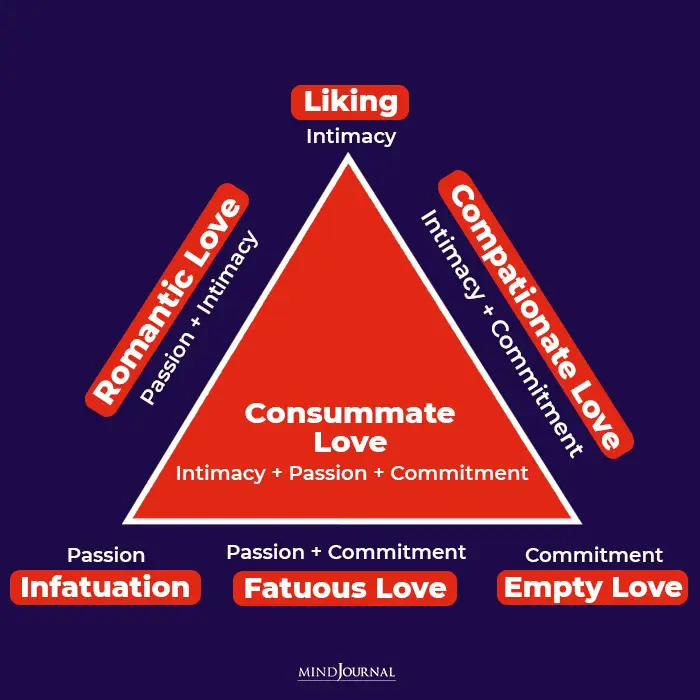
Robert Sternberg came up with a new theory of love, called The Triangular Theory of Love which is made up of 3 components:
- Intimacy
- Passion and
- Commitment.
Each component stands as a generic combination of feelings that give rise to different types of love.
Related: A Truth about Intimacy Love and Romance
Although everyone‘s thoughts on what makes them drawn to another person are different. However the attachment that we feel towards another person is common to all.
This attachment that we feel towards another person is based on physical and emotional connection. This connection is difficult to explain since there are a number of factors that may influence it.
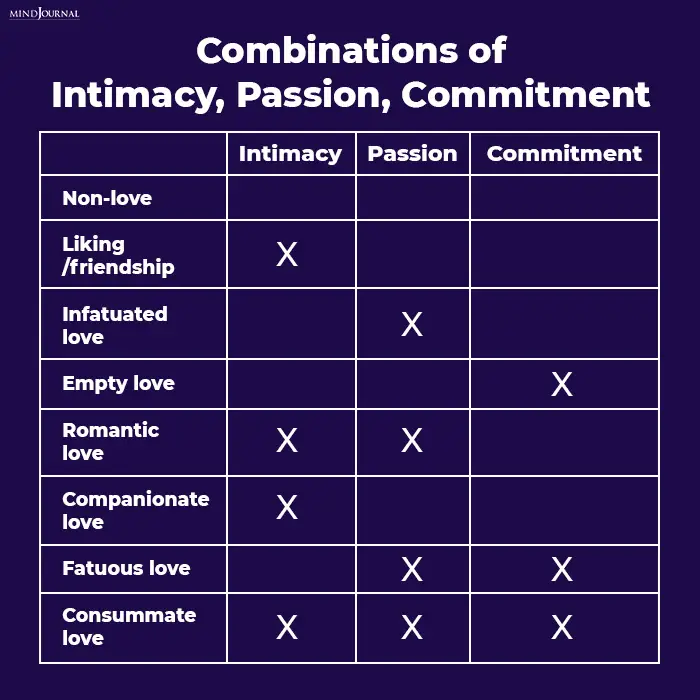
1. Intimacy
Intimacy refers to feelings of closeness, connectedness, and bondedness in loving relationships. It thus includes within its purview those feelings that give rise, essentially, to the experience of warmth in a loving relationship.
In intimacy there is a sense of high regard for each other. There is a definite wish to make each other happy, communicate with each other and help each other in need.
Sternberg’s prediction of this love was that it would diminish as the relationship became less interrupted, thus increasing predictability.
2. Passion
Passion refers to the drives that lead to romance, physical attraction, sexual consummation, and related phenomena in loving relationships. This is associated with strong feelings of love and desire for a specific person. This love is full of excitement and newness.
Passionate love is important at the beginning of the relationship and typically lasts for about a year. There is a chemical component to passionate love. Those experiencing passionate love are also experiencing increased neurotransmitters, specifically phenylethylamine.
3. Decision/commitment
Decision/commitment refers, in the short-term, to the decision that one loves a certain other, and in the long-term, to one’s commitment to maintaining that love.
These two aspects of the decision/commitment component do not necessarily go together, in that one can decide to love someone without being committed to the love in the long-term, or one can be committed to a relationship without acknowledging that one loves the other person in the relationship.
Implications of The Triangular Theory of Love in relationships
According to Robert Sternberg, the three components of love interact with each other. For example, greater intimacy may lead to greater passion or commitment, just as greater commitment may lead to greater intimacy, or with lesser likelihood, greater passion.
In general, then, the components are separable but interactive with each other. Although all three components are important parts of loving relationships, their importance may differ from one relationship to another, or over time within a given relationship.
Indeed, different kinds of love can be generated by limiting cases of different combinations of the components.
Related: 11 Steps to Prepare Yourself For The Big Love You Know You Deserve
The three components of love generate eight possible kinds of love when considered in combination.
It is important to realize that these kinds of love are, in fact, limiting cases: No relationship is likely to be a pure case of any of them.
1) Non love refers simply to the absence of all three components of love.
2) Liking results when one experiences only the intimacy component of love in the absence of the passion and decision/commitment components.
3) Infatuated love results from the experiencing of the passion component in the absence of the other components of love.
4) Empty love emanates from the decision that one loves another and is committed to that love in the absence of both the intimacy and passion components of love.
5) Romantic love derives from a combination of the intimacy and passion components.
6) Companionate love derives from a combination of the intimacy and decision/commitment components of love.
7) Fatuous love results from the combination of the passion and decision/commitment components in the absence of the intimacy component.
8) Consummate, or complete love, results from the full combination of all three components.
The geometry of the “love triangle” depends upon two factors: amount of love and balance of love.
Differences in amounts of love are represented by differing areas of the love triangle: The greater the amount of love, the greater the area of the triangle.
Differences in balances of the three kinds of love are represented by differing shapes of triangles. For example, balanced love (roughly equal amounts of each component) is represented by an equilateral triangle.
Love does not involve only a single triangle.
Rather, it involves a great number of triangles, only some of which are of major theoretical and practical interest. For example, it is possible to contrast real versus ideal triangles. One has not only a triangle representing his or her love for the other but also a triangle representing an ideal other for that relationship.
Finally, it is important to distinguish between triangles of feelings and triangles of action.
This theory and its implications thus provides an important frame of reference in love. However it is to be noted that each couple and each individual experiences love differently both in intensity and quality.
References:
Sternberg, R. J., & Grajek, S. (1984). The nature of love. Journal of Personality and Social Psychology, 47, 312–329. Sternberg, R. J., & Barnes, M. (1985). Real and ideal others in romantic relationships: Is four a crowd? Journal of Personality and Social Psychology, 49, 1586–1608. Sternberg, R. J. (1986). A triangular theory of love. Psychological Review, 93, 119–135. Sternberg, R. J. (1987). Liking versus loving: A comparative evaluation of theories. Psychological Bulletin, 102, 331–345. Sternberg, R. J. (1988). Triangulating love. In R. J. Sternberg & M. Barnes (Eds.), The psychology of love (pp. 119–138). New Haven, CT: Yale University Press. Sternberg, R. J. (1988). The triangle of love. New York: Basic.
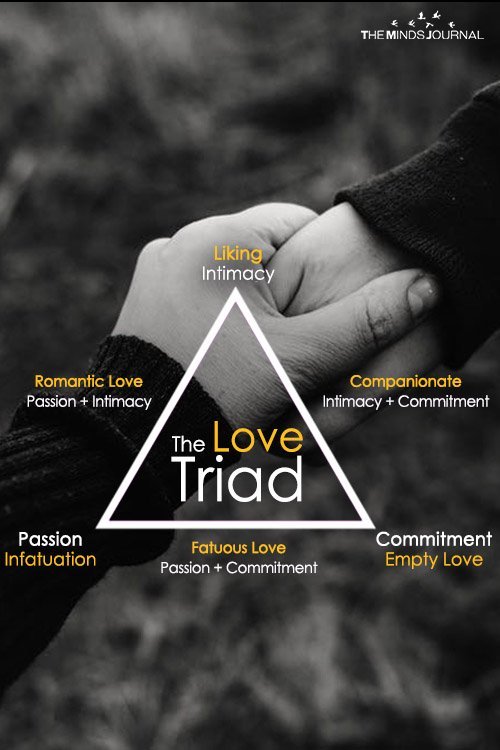
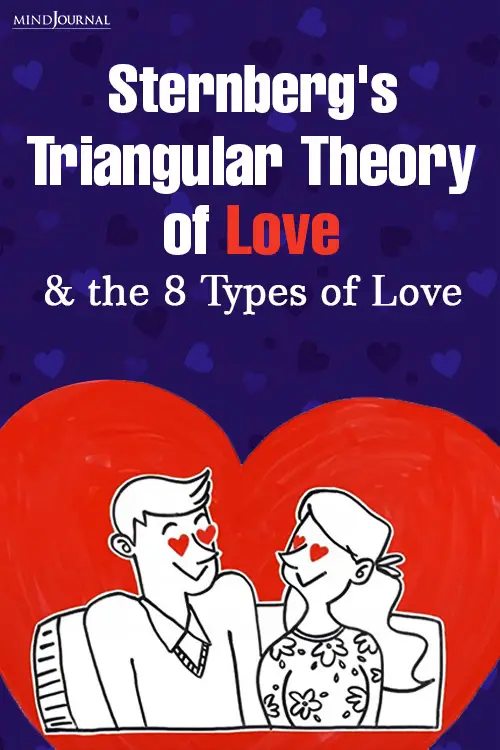
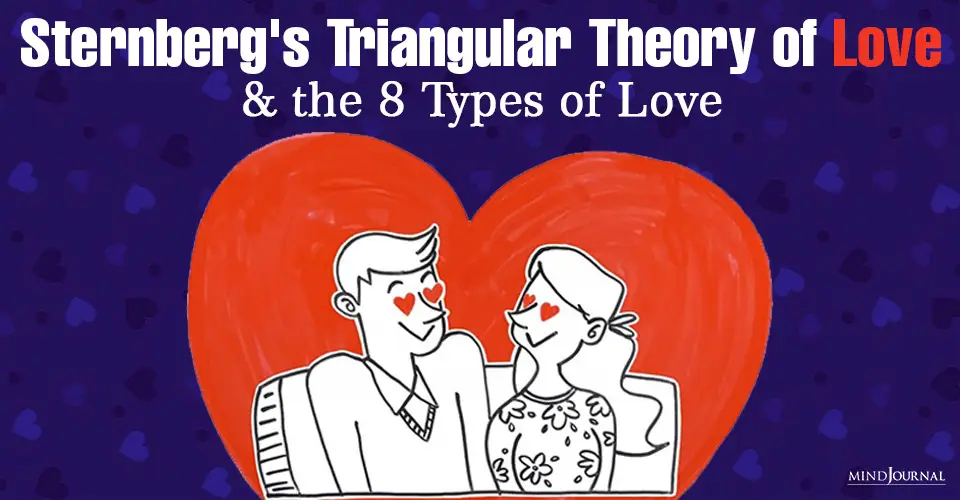







Leave a Reply
You must be logged in to post a comment.